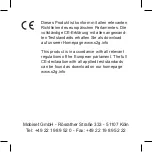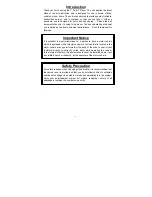
37
2
2
Bypass the AVR
Bypassing the AVR will test all wiring and windings within the
alternator without disassembly of the generator. There are
two AC Voltage checks and one DC Amperage test to be
performed. The exact readings may vary depending on
ambient temperature, battery voltage, meter calibration, etc.
This test requires a fully charged 12V battery.
Using a
battery that is not fully charged will give inaccurate
readings.
An open in the rotor could cause lowered voltage readings
during these tests. Check and record all the voltage readings
first, then check and record the amperage draw on the rotor.
These tests require a fully charged 12V battery. Using a
battery that is not fully charged will give inaccurate readings.
1. Set the control panel system switch to
OFF
.
2. Remove the 15 Amp fuse.
3. Switch the generator circuit breaker
OFF
.
4. Disconnect Wires #1, #4, #11A, #22A, #2, and #6
from the AVR.
5. Set meter to measure AC Voltage. Connect one test
lead to Wire #2 and the other lead to Wire #6 (Figure
18).
Figure 18
6. Connect a jumper wire from battery positive (
+
) to
Wire #4 (positive brush wire). Then connect another
jumper wire from battery negative (
-
) to Wire #1
(negative brush wire) (Figure 19).
Figure 19
7. Reinstall the 15 Amp fuse.
8. Manually start the unit and measure AC voltage
across Wire #2 and Wire #6. A minimum of 60VAC
should be measured.
9. Set control panel system switch to
OFF
.
10. Connect one test lead to Wire #11A and the other
lead to Wire #22A (Figure 20).
WARNING
Battery posts, terminals, and related
accessories contain lead and lead compounds, chemicals
known to the State of California to cause cancer and
reproductive harm. Wash hands after handling.
WARNING
Generators produce hazardous voltage. Failure
to properly ground generator can result in
electrocution. Failure to isolate generator from power
utility can result in death or injury to electric utility
workers due to back feed of electrical energy.
•
DO NOT touch bare wires or bare receptacles.
•
DO NOT use generator with electrical cords which are
worn, frayed, bare, or otherwise damaged.
•
DO NOT handle generator or electrical cords while standing
in water, while barefoot, or while hands and feet are wet.
•
If you must work around a unit while it is operating, stand
on an insulated dry surface to reduce the risk of a shock
hazard.
•
DO NOT allow unqualified persons or children to operate or
service generator.
•
In case of accident caused by electrical shock, immediately
shut down the source of electrical power and contact the
local authorities.
Avoid direct contact with the victim.
•
Despite the safe design of the residential generator,
operating the equipment imprudently, neglecting its
maintenance, or being careless can cause possible injury
or death.
•
Remain alert at all times while working on this equipment.
Never work on the equipment when you are physically or
mentally fatigued.
•
Before performing any maintenance on the generator,
disconnect the battery cable indicated by a
NEGATIVE
,
NEG
or (
-
) first. When finished, reconnect that cable last.
•
After the system is installed, the generator may crank and
start without warning any time there is a power failure. To
prevent possible injury, always set the control panel system
switch to
OFF
, remove the service disconnect from the
disconnect box, AND remove the 15 Amp fuse BEFORE
working on the equipment.
Not
for
Reproduction
Summary of Contents for 040298
Page 23: ...19 1 1 N o t f o r R e p r o d u c t i o n...
Page 24: ...20 1 1 N o t f o r R e p r o d u c t i o n...
Page 29: ...25 2 2 N o t f o r R e p r o d u c t i o n...
Page 33: ...29 2 2 N o t f o r R e p r o d u c t i o n...
Page 36: ...32 2 2 N o t f o r R e p r o d u c t i o n...
Page 37: ...33 2 2 N o t f o r R e p r o d u c t i o n...
Page 43: ...39 2 2 N o t f o r R e p r o d u c t i o n...
Page 47: ...43 2 2 N o t f o r R e p r o d u c t i o n...
Page 50: ...46 2 2 N o t f o r R e p r o d u c t i o n...
Page 51: ...47 2 2 N o t f o r R e p r o d u c t i o n...
Page 55: ...51 2 2 N o t f o r R e p r o d u c t i o n...
Page 58: ...54 2 2 N o t f o r R e p r o d u c t i o n...
Page 66: ...4 N o t f o r R e p r o d u c t i o n...
















































